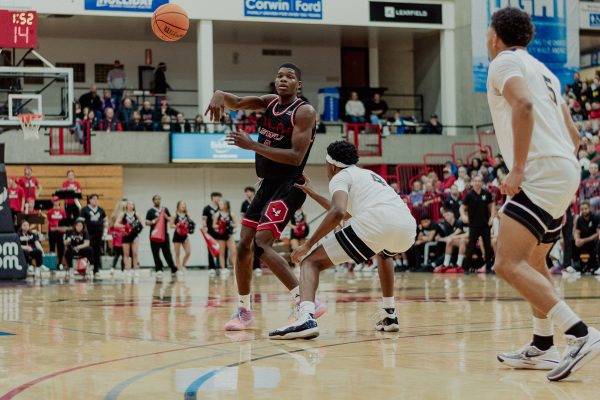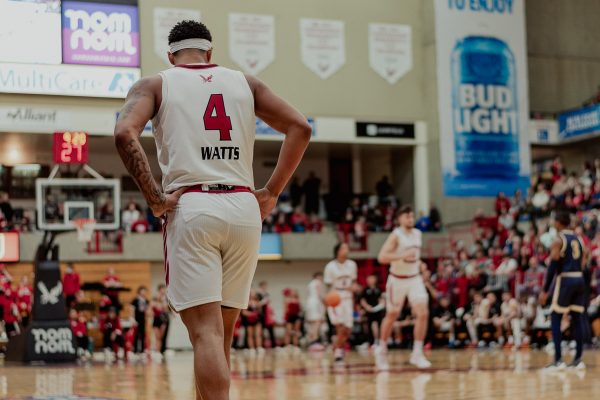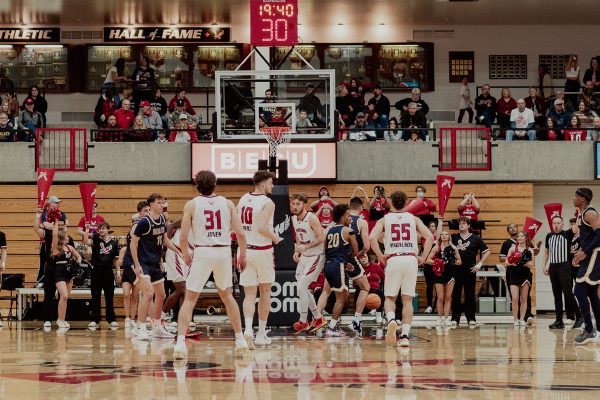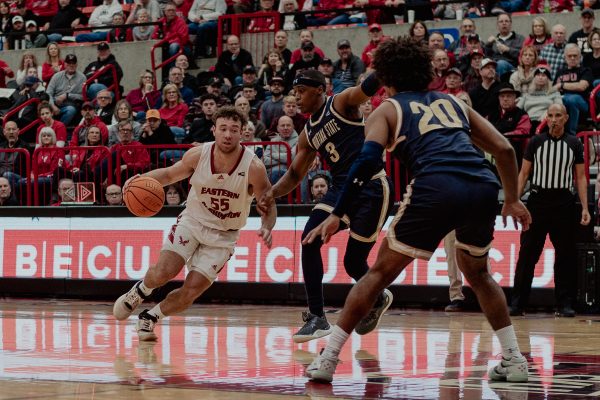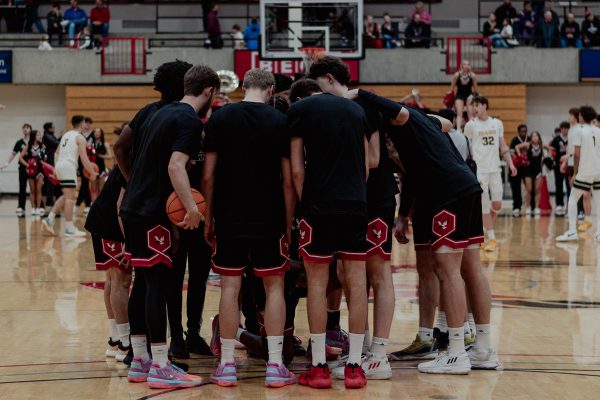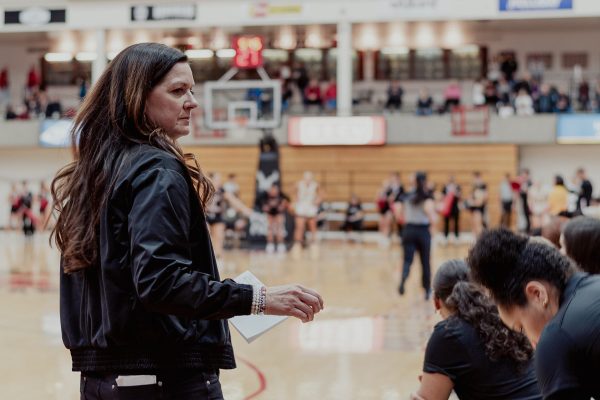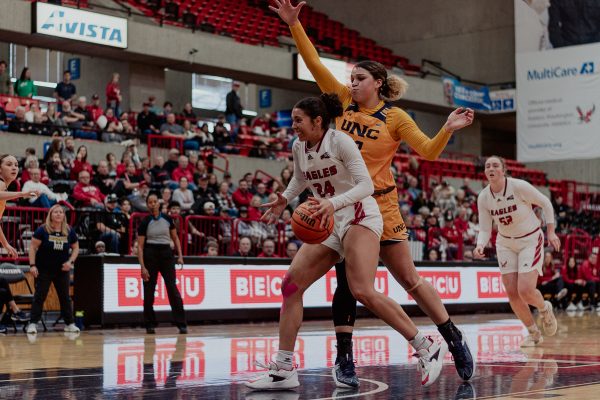Clippers scandal sparks reaction at EWU

May 19, 2014
Donald Sterling euro-stepped his way back to an 18th century plantation and the NBA v. Sterling battle is just beginning.
On April 29, new NBA commissioner Adam Silver banned Los Angeles Clippers owner Donald Sterling for life from attending NBA games, events or anything associated with the NBA along with a maximum fine of $2.5 million.
Dr. Scott Finnie, who played basketball at Gonzaga University and is an Africana studies professor at EWU, was surprised but pleased at Silver putting the hammer down on Sterling.
“I think they made the best decision and I was surprised that it was that clean cut. When you’ve got people that have access to power, privilege and policymaking, they become a little elite interest group that looks out for each other and here you got the system judging the system,” Finnie said.
Two audio clippings were leaked of Sterling and his girlfriend, V. Stiviano, having an argument that brought out racist remarks from Sterling. The dispute was sparked by an image Stiviano uploaded to her Instagram of her with hall of fame basketball player, Magic Johnson.
In the audio clips, Sterling’s girlfriend is challenging him about his views and telling him she was not raised with the same views as him. “Well then, if you don’t feel — don’t come to my games. Don’t bring black people, and don’t come,” Sterling replies.
Stiviano then asks if Sterling is aware that the team he owns is predominantly African-American.
“You just, do I know? I support them and give them food, and clothes, and cars, and houses. Who gives it to them? Does someone else give it to them?” was his response.
The Internet was full of angry responses Sterling’s comments from former and current NBA players and civil citizens. Most shared the same views that bigotry is not allowed anywhere in the league and that something needed to be done as soon as possible.
Martin Seiferth, a junior forward for EWU men’s basketball, was taken aback by the comments and was also pleased with Silver’s decision.
“I was shocked that someone who runs an NBA team would say that,” Seiferth said. “I feel like racism and everything that comes with it shouldn’t exist in the NBA. It was totally the right thing to do.”
For Dr. Finnie, the comments took him back in time to the days when African-Americans were just seen as entertainers and they would have to dress in clown-like apparel and act in an according way.
“It brought me back to the Harlem Globetrotters,” Finnie said. “They started in 1927 and that was the only way for African-American athletes, at least basketball players, could play professionally and be paid well and play in air-conditioned buildings. So for the next 30 years, you’ve got African-Americans who will only dress up as clowns and do clown antics to get recognized as professional players and to get paid.”
The Clippers were in the middle of their first round playoff series versus the Golden State Warriors when the audio clips leaked. Finnie did not agree with the choice the Clippers made to play their fourth game of the series.
“I think, first of all the players should not have put on that uniform again immediately because you play as an athlete secondarily. You’re an individual, a man, or a representative of others primarily. And when that’s torn down to the degree that gentleman [Sterling] boxed all African-Americans in such a group, I don’t even think there should be a jump ball. They shouldn’t play the next game because the plantation mentality was too evident.”
Many minorities believed that the Clippers missed a real opportunity to make a difference in standing up, not just for themselves, but for minorities everywhere. Sterling was not only tearing down his players and staff but a culture as a whole. The battle goes beyond basketball.
“If you look at the 1968 Olympics, Tommie Smith and John Carlos did the black fisted symbol and that was a great opportunity,” Finnie said. “They lost their medals, but they left a lasting legacy that my talents are not for sell if you’re going to downgrade my civil rights in America. Even though the players are contractually tied up, they’ve got enough money and enough quality gifts that someone else would want them down the road. And they have enough money to legally to swallow whatever problem came up because it was more of an issue of the principle than the dollar bill. It would’ve been a great opportunity. “
Under Title VII of the Civil Rights Act in the United States Constitution, it forbids employers from handing out fines to parties for imposing discrimination. NBA contracts can also not diminish civil rights protections; Meaning NBA players who boycott games may be protected under the law.
EWU junior forward Garrett Moon, understood the missed opportunity to make a statement, but also why they decided to play.
“They did miss a moment to make history but if [Sterling] were to not get penalized, they wouldn’t have played. If he‘d kept his job, then there would’ve been more of a rebellion. But [the NBA] handled it. They got him out of there,” Moon said. “As an athlete, I don’t think that they’re necessarily playing for their owner, even though he represented them badly. They’re not playing for him, they’re playing for themselves and their fans.”
The board of governors, which is made up of all 30 NBA owners, will meet and vote to forcibly make Sterling sell the Clippers. Hopefully, with Silver’s hammer of a punishment the owners will back up their commissioner and unanimously vote him out.
Ironic how Sterling did not want his girlfriend to bring any minorities to “his games” and now he will never be able to attend one.






![Simmons said the biggest reasons for her success this year were “God, hard work, and trusting [her] coach and what she has planned.”](https://theeasterner.org/wp-content/uploads/2024/05/image1-1-1200x800.jpg)

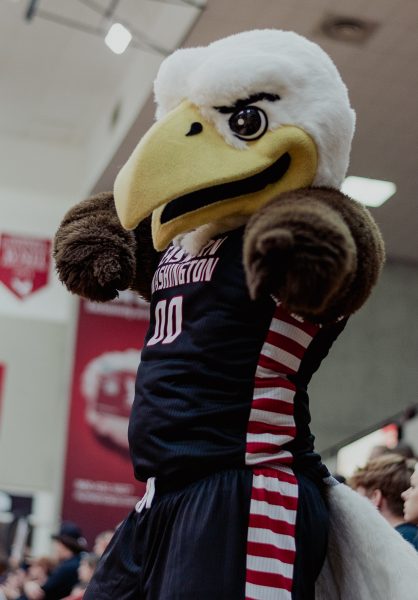

![Simmons said the biggest reasons for her success this year were “God, hard work, and trusting [her] coach and what she has planned.”](https://theeasterner.org/wp-content/uploads/2024/05/image1-1-600x400.jpg)
